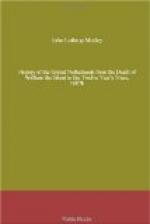Meantime, the French commissioners—Pierre Jeannin, Buzanval, regular resident at the Hague, and De Russy, who was destined to succeed that diplomatist—had arrived in Holland.
The great drama of negotiation, which was now to follow the forty years’ tragedy, involved the interests and absorbed the attention of the great Christian powers. Although serious enough in its substance and its probable consequences, its aspect was that of a solemn comedy. There was a secret disposition on the part of each leading personage—with a few exceptions—to make dupes of all the rest. Perhaps this was a necessary result of statesmanship, as it had usually been taught at that epoch.
Paul V., who had succeeded Clement VIII. in 1605, with the brief interlude of the twenty-six days of Leo XI.’s pontificate, was zealous, as might be supposed, to check the dangerous growth of the pestilential little republic of the north. His diplomatic agents, Millino at Madrid, Barberini at Paris, and the accomplished Bentivoglio, who had just been appointed to the nunciatura at Brussels, were indefatigable in their efforts to suppress the heresy and the insolent liberty of which the upstart commonwealth was the embodiment.
Especially Barberini exerted all the powers at his command to bring about a good understanding between the kings of France and Spain. He pictured to Henry, in darkest colours, the blight that would come over religion and civilization if the progress of the rebellious Netherlands could not be arrested. The United Provinces were becoming dangerous, if they remained free, not only to the French kingdom, but to the very existence of monarchy throughout the world.
No potentate was ever more interested, so it was urged, than Henry IV. to bring down the pride of the Dutch rebels. There was always sympathy of thought and action between the Huguenots of France and their co-religionists in Holland. They were all believers alike in Calvinism— a sect inimical not less to temporal monarchies than to the sovereign primacy of the Church—and the tendency and purposes of the French rebels were already sufficiently manifest in their efforts, by means of the so-called cities of security, to erect a state within a state; to introduce, in short, a Dutch republic into France.
A sovereign remedy for the disease of liberty, now threatening to become epidemic in Europe, would be found in a marriage between the second son of the King of Spain and a daughter of France. As the archdukes were childless, it might be easily arranged that this youthful couple should succeed them—the result of which would of course be the reduction of all the Netherlands to their ancient obedience.
It has already been seen, and will become still farther apparent, that nostrums like this were to be recommended in other directions. Meantime, Jeannin and his colleagues made their appearance at the Hague.




